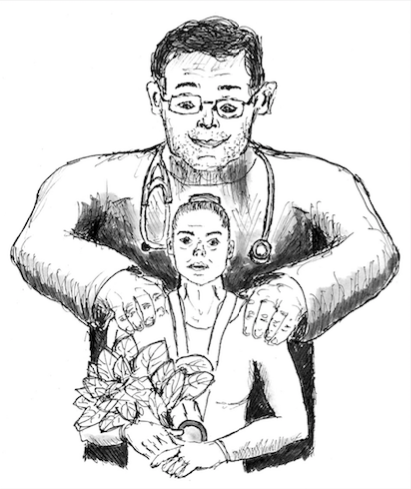Illustration by Leo Gordon
Gymnast and Olympic gold medalist McKayla Maroney is one of 140 people to come forward as victims of sexual abuse by Larry Nassar, the physician for Team USA gymnastics for four Olympic games. Maroney revealed the abuse in a tweet on October 18, advocating for change in the USA Gymnastics organization and encouraging other survivors.
“It’s never too late to speak up,” tweeted Maroney.
Maroney said the abuse started when she attended a summer training camp at thirteen, and didn’t stop until she left gymnastics at age 20. Maroney added that “It seemed whenever and wherever this man could find the chance, I was ‘treated.’”
She and other athletes report that Nassar would meet alone with them in their rooms and disguise the abuse as medical treatment. He would even grope athletes when their parents were present, hiding his actions under a towel. The gymnasts remained silent at the time. Nassar was in a position of power and their careers as Olympians could easily be compromised by accusing a high-ranking USA Gymnastics official. Moreover, Nassar continually told the athletes that everything he did to them was established medical procedure. No one spoke up until last August, when gymnast Rachael Denhollander filed the first sexual abuse case against Nassar.
He now faces 33 counts of criminal sexual misconduct and potentially faces life in prison.
The lawsuits against Nassar have caused California Senator Dianne Feinstein to introduce new legislation cracking down on sex offenders by, among other things, requiring athletes by law to report allegations of sexual abuse to child-welfare agencies or law enforcement. USA Gymnastics took five weeks to report the allegations against Nassar, only doing so after conducting their own investigation.
“Is it possible for survivors to speak up without putting careers, and dreams, in jeopardy?” Maroney asked in her tweet. There is increasing reason to believe the answer is yes.
Less than a decade ago, Dominique Moceanu, a similarly decorated USA gymnast, accused her coaches of physical and emotional abuse and was iced out of the sport — but now, Aly Raisman, a 2012 and 2016 Olympic gymnast who plans on competing in 2020, has publicly criticized the 1 million dollar severance package received by USA Gymnastics president Steve Penny, who resigned in March amid controversy over how slowly the organization reacted to the lawsuits against Nassar. Raisman suggested a better use for the money: paying for therapy for Nassar’s victims.
Though Raisman has not claimed to be a victim herself, the fact that she can openly condemn the highest level of the organization that controls her career shows how the handling of sexual abuse has shifted in the sport.
The shift is not just in gymnastics. Maroney’s tweet was inspired by the #MeToo movement surrounding movie producer Harvey Weinstein.
More and more people are speaking up about sexual harassment and abuse, in part because each exposé reveals that others are possible. From Trump dismissing his sexist comments as “locker room talk” to members of the Harvard men’s cross country team ranking their female teammates by sexual appeal, sports culture has been almost indelibly tied to rape culture in this country.
This is largely a result of the fact that very few athletes are educated about their power to speak up. Hopefully, these women using their platforms as Olympians will enable more victims to speak up in the future.
In her tweet, Maroney said, “I had a dream of going to the Olympics, and the things I had to endure to get there were unnecessary and disgusting.”
This incident prompted former federal prosecutor Deborah Daniels to formally review the USA Gymnastic Federation’s practices. Following the investigation, Daniels reported that USA Gymnastics needed a “complete cultural change” in order to ensure that the safety of athletes is prioritized over winning Olympic medals.
Already, some USA Gymnastics institutions are making sure that athletes are never left alone with coaches and are educated about sexual abuse. It appears that this culture of silence is changing. Sexual abuse relies on victims staying quiet, but victims are slowly but surely opening up and telling their stories.
“Our silence has given the wrong people power for too long,” Maroney tweeted. “It’s time to take our power back.”


